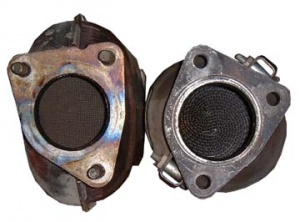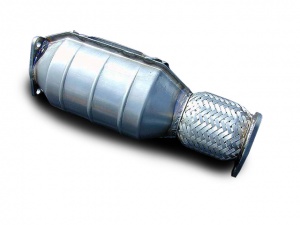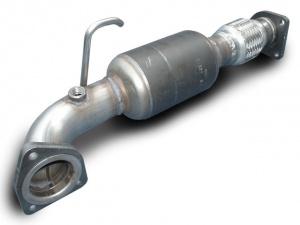Difference between revisions of "Sports CAT"
The DustRoom (talk | contribs) m |
|||
| (9 intermediate revisions by 3 users not shown) | |||
| Line 1: | Line 1: | ||
| − | A '''Sports | + | [[Image:Std vs sport matrix.jpg|thumb|left|Standard (left) and Sports (right) CAT's side-by-side]] |
| − | + | A '''Sports CAT''' allow the engine to breath a little more freely than the standard CAT and should not be confused with a [[CRP]] or [[SCRP]]. | |
| − | |||
| + | [[Catalytic converter|Standard CATs]] are ceramic, a Sports CAT tend to be made from stainless steel and therefore can stand more abuse without failing. Inside a CAT is a [http://en.wikipedia.org/wiki/Honeycomb honeycombe type structure] which is measured in cells/inch. The heigher the number the smaller the holes and the more restrictive the CAT. Standard CATs tend to be around 400 whereas Sports CATs are anything from 100 to 200. | ||
| + | {{clr}} | ||
==Noise== | ==Noise== | ||
Small increase in noise and a few nice pops and bangs. | Small increase in noise and a few nice pops and bangs. | ||
| Line 19: | Line 20: | ||
That said, at the end of the day, the higher the surface area, the better it will work as a CAT, this is against the lower flow that a high surface area CAT will have. | That said, at the end of the day, the higher the surface area, the better it will work as a CAT, this is against the lower flow that a high surface area CAT will have. | ||
| − | For MOT here, a decent (not cheap) 100 cell one will do the job (assuming the | + | For MOT here, a decent (not cheap) 100-cell one will do the job (assuming the engine is OK), the only problem comes if you have to pass something like the IM240 test, in which case, you need something denser than the 100-cell one. |
| + | |||
| + | ==S1== | ||
| + | [[Image:S1sportscat.jpg|thumb|left|Elise S1 'Sports' catalytic converter with a flexi section]] | ||
| + | {{clr}} | ||
| + | |||
| + | ==S2== | ||
| + | |||
| + | ==S2 Sports CAT== | ||
| + | [[Image:S2sportscat.jpg|thumb|left|Elise S2 'Sports' catalytic converter with a flexi section]] | ||
| + | {{clr}} | ||
| + | |||
| + | [[Category:Exhaust]] | ||
| + | [[Category:Lotus Elise]] | ||
| + | [[Category:S1]] | ||
| + | [[Category:S2]] | ||
Latest revision as of 09:25, 29 March 2012
A Sports CAT allow the engine to breath a little more freely than the standard CAT and should not be confused with a CRP or SCRP.
Standard CATs are ceramic, a Sports CAT tend to be made from stainless steel and therefore can stand more abuse without failing. Inside a CAT is a honeycombe type structure which is measured in cells/inch. The heigher the number the smaller the holes and the more restrictive the CAT. Standard CATs tend to be around 400 whereas Sports CATs are anything from 100 to 200.
Noise
Small increase in noise and a few nice pops and bangs.
Performance
A small increase in performance but almost negligible.
Weight Saving
A Sports CAT is considerably lighter than a standard CAT.
MOT & Legality & Insurance
Some are cheap and have a very low 'dose' of wash coat (like 5gramms per cubic foot) - the coatings cost the money, and you can't see them, so it's easy to make savings here.
Then there are different coatings, stuff like MEX45 or MEGC62 etc.
That said, at the end of the day, the higher the surface area, the better it will work as a CAT, this is against the lower flow that a high surface area CAT will have.
For MOT here, a decent (not cheap) 100-cell one will do the job (assuming the engine is OK), the only problem comes if you have to pass something like the IM240 test, in which case, you need something denser than the 100-cell one.
S1
S2
S2 Sports CAT


